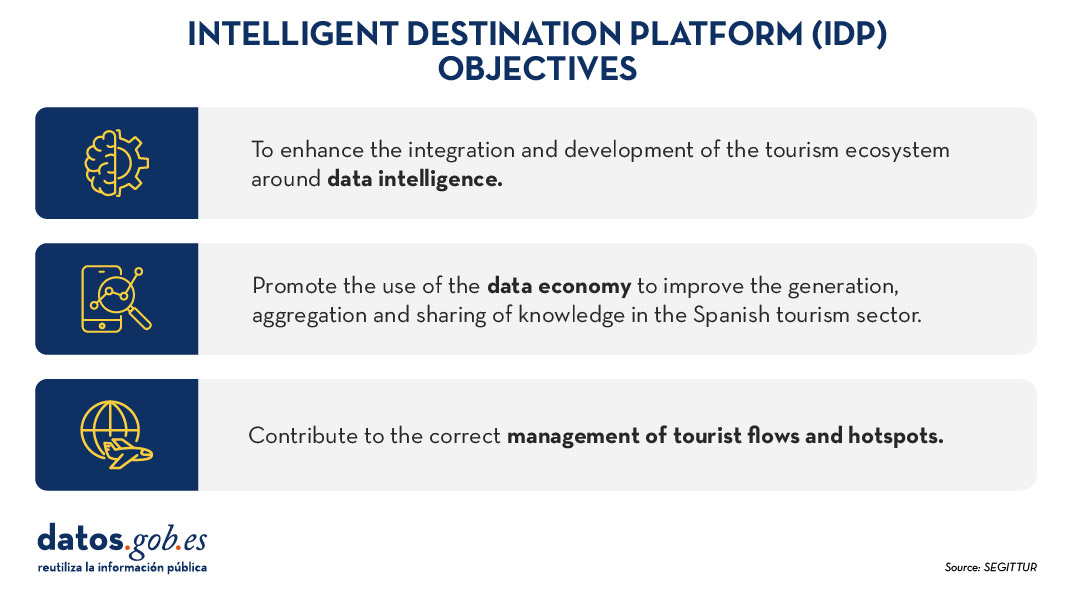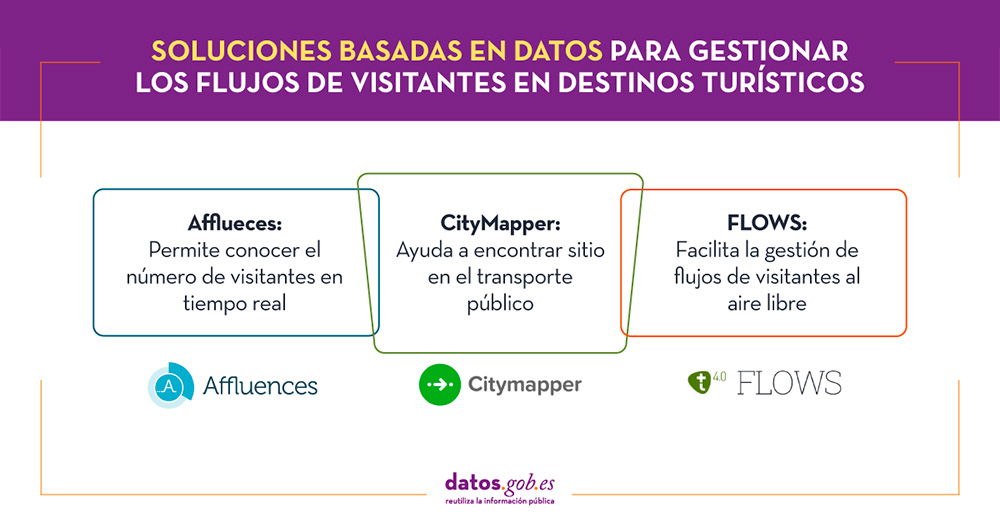How SEGITTUR drives smart and sustainable tourism through data sharing
Fecha de la noticia: 14-11-2024

Tourism is one of Spain's economic engines. In 2022, it accounted for 11.6% of Gross Domestic Product (GDP), exceeding €155 billion, according to the Instituto Nacional de Estadística (INE). A figure that grew to 188,000 million and 12.8% of GDP in 2023, according to Exceltur, an association of companies in the sector. In addition, Spain is a very popular destination for foreigners, ranking second in the world and growing: by 2024 it is expected to reach a record number of international visitors, reaching 95 million.
In this context, the Secretariat of State for Tourism (SETUR), in line with European policies, is developing actions aimed at creating new technological tools for the Network of Smart Tourist Destinations, through SEGITTUR (Sociedad Mercantil Estatal para la Gestión de la Innovación y las Tecnologías Turísticas), the body in charge of promoting innovation (R&D&I) in this industry. It does this by working with both the public and private sectors, promoting:
- Sustainable and more competitive management models.
- The management and creation of smart destinations.
- The export of Spanish technology to the rest of the world.
These are all activities where data - and the knowledge that can be extracted from it - play a major role. In this post, we will review some of the actions SEGITTUR is carrying out to promote data sharing and openness, as well as its reuse. The aim is to assist not only in decision-making, but also in the development of innovative products and services that will continue to position our country at the forefront of world tourism.
Dataestur, an open data portal
Dataestur is a web space that gathers in a unique environment open data on national tourism. Users can find figures from a variety of public and private information sources.
The data are structured in six categories:
- General: international tourist arrivals, tourism expenditure, resident tourism survey, world tourism barometer, broadband coverage data, etc.
- Economy: tourism revenues, contribution to GDP, tourism employment (job seekers, unemployment and contracts), etc.
- Transport: air passengers, scheduled air capacity, passenger traffic by ports, rail and road, etc.
- Accommodation: hotel occupancy, accommodation prices and profitability indicators for the hotel sector, etc.
- Sustainability: air quality, nature protection, climate values, water quality in bathing areas, etc.
- Knowledge: active listening reports, visitor behaviour and perception, scientific tourism journals, etc.
The data is available for download via API.
Dataestur is part of a more ambitious project in which data analysis is the basis for improving tourist knowledge, through actions with a wide scope, such as those we will see below.
Developing an Intelligent Destination Platform (IDP)
Within the fulfillment of the milestones set by the Next Generation funds, and corresponding to the development of the Digital Transformation Plan for Tourist Destinations, the Secretary of State for Tourism, through SEGITTUR, is developing an Intelligent Destination Platform (PID). It is a platform-node that brings together the supply of tourism services and facilitates the interoperability of public and private operators. Thanks to this platform it will be possible to provide services to integrate and link data from both public and private sources.
Some of the challenges of the Spanish tourism ecosystem to which the IDP responds are:
- Encourage the integration and development of the tourism ecosystem (academia, entrepreneurs, business, etc.) around data intelligence and ensure technological alignment, interoperability and common language.
- To promote the use of the data economy to improve the generation, aggregation and sharing of knowledge in the Spanish tourism sector, driving its digital transformation.
- To contribute to the correct management of tourist flows and tourist hotspots in the citizen space, improving the response to citizens' problems and offering real-time information for tourist management.
- Generate a notable impact on tourists, residents and companies, as well as other agents, enhancing the brand "sustainable tourism country" throughout the travel cycle (before, during and after).
- Establish a reference framework to agree on targets and metrics to drive sustainability and carbon footprint reduction in the tourism industry, promoting sustainable practices and the integration of clean technologies.

Figure 1. Objectives of the Intelligent Destination Platform (IDP).
New use cases and methodologies to implement them
To further harmonise data management, up to 25 use cases have been defined that enable different industry verticals to work in a coordinated manner. These verticals include areas such as wine tourism, thermal tourism, beach management, data provider hotels, impact indicators, cruises, sports tourism, etc.
To implement these use cases, a 5-step methodology is followed that seeks to align industry practices with a more structured approach to data:
- Identify the public problems to be solved.
- Identify what data are needed to be available to be able to solve them.
- Modelling these data to define a common nomenclature, definition and relationships.
- Define what technology needs to be deployed to be able to capture or generate such data.
- Analyse what intervention capacities, both public and private, are needed to solve the problem.
Boosting interoperability through a common ontology and data space
As a result of this definition of the 25 use cases, a ontology of tourism has been created, which they hope will serve as a global reference. The ontology is intended to have a significant impact on the tourism sector, offering a series of benefits:
- Interoperability: The ontology is essential to establish a homogeneous data structure and enable global interoperability, facilitating information integration and data exchange between platforms and countries. By providing a common language, definitions and a unified conceptual structure, data can be comparable and usable anywhere in the world. Tourism destinations and the business community can communicate more effectively and agilely, fostering closer collaboration.
- Digital transformation: By fostering the development of advanced technologies, such as artificial intelligence, tourism companies, the innovation ecosystem or academia can analyse large volumes of data more efficiently. This is mainly due to the quality of the information available and the systems' better understanding of the context in which they operate.
- Tourism competitiveness: Aligned with the previous question, the implementation of this ontology contributes to eliminating inequalities in the use and application of technology within the sector. By facilitating access to advanced digital tools, both public institutions and private companies can make more informed and strategic decisions. This not only raises the quality of the services offered, but also boosts the productivity and competitiveness of the Spanish tourism sector in an increasingly demanding global market.
- Tourist experience: Thanks to ontology, it is possible to offer recommendations tailored to the individual preferences of each traveller. This is achieved through more accurate profiling based on demographic and behavioural characteristics as well as specific motivations related to different types of tourism. By personalising offers and services, customer satisfaction before, during and after the trip is improved, and greater loyalty to tourist destinations is fostered.
- Governance: The ontology model is designed to evolve and adapt as new use cases emerge in response to changing market demands. SEGITTUR is actively working to establish a governance model that promotes effective collaboration between public and private institutions, as well as with the technology sector.
In addition, to solve complex problems that require the sharing of data from different sources, the Open Innovation Platform (PIA) has been created, a data space that facilitates collaboration between the different actors in the tourism ecosystem, both public and private. This platform enables secure and efficient data sharing, empowering data-driven decision making. The PIA promotes a collaborative environment where open and private data is shared to create joint solutions to address specific industry challenges, such as sustainability, personalisation of the tourism experience or environmental impact management.
Building consensus
SEGITTUR is also carrying out various initiatives to achieve the necessary consensus in the collection, management and analysis of tourism-related data, through collaboration between public and private actors. To this end, the Ente Promotor de la Plataforma Inteligente de Destinoswas created in 2021, which plays a fundamental role in bringing together different actors to coordinate efforts and agree on broad lines and guidelines in the field of tourism data.
In summary, Spain is making progress in the collection, management and analysis of tourism data through coordination between public and private actors, using advanced methodologies and tools such as the creation of ontologies, use cases and collaborative platforms such as PIA that ensure efficient and consensual management of the sector.
All this is not only modernising the Spanish tourism sector, but also laying the foundations for a smarter, more intelligent, connected and efficient future. With its focus on interoperability, digital transformation and personalisation of experiences, Spain is positioned as a leader in tourism innovation, ready to face the technological challenges of tomorrow.













